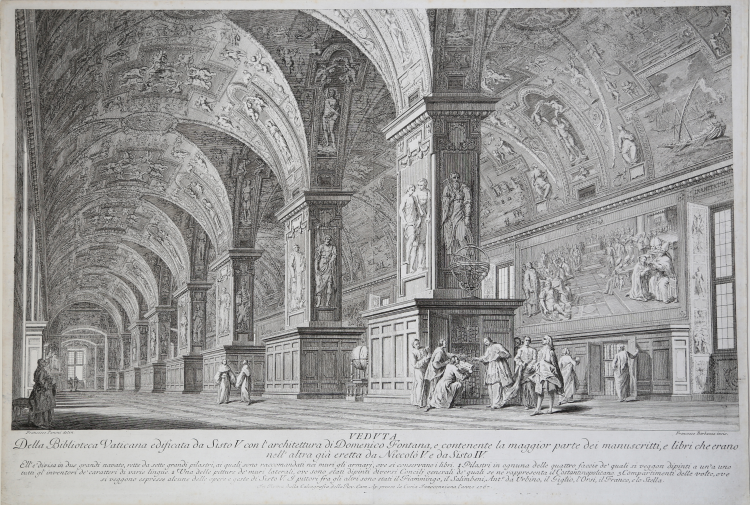




| Reference: | S40569 |
| Author | Francesco BARBAZZA |
| Year: | 1767 |
| Zone: | San Pietro |
| Printed: | Rome |
| Measures: | 722 x 495 mm |



| Reference: | S40569 |
| Author | Francesco BARBAZZA |
| Year: | 1767 |
| Zone: | San Pietro |
| Printed: | Rome |
| Measures: | 722 x 495 mm |
View of the Vatican Library, engraved by Francesco Barbazza after a drawing by Francesco Panini.
The work belongs to a series of views of Rome printed in the second half of the 18th century at the behest of Panini, who availed himself of the collaboration of the best engravers of the time: Vasi, Antonini, Barbazza, Cigni, Montagu, Polanzani, Volpato and many others. The plates are printed by the Calcografia of Reverenda Camera Apostolica.
Francesco Panini or Pannini (Rome 1738 - April 10, 1800) trained with his father Giovanni Paolo (Piacenza, 1691 - Rome, 1765) and continued the activity of vedutistica devoting himself in particular to the realization of refined works on paper. In fact, the scarce critical attention dedicated to him, betrays the real historical importance of the painter, who is to be considered among the best interpreters of eighteenth-century graphics. His production, in fact, while perpetuating a precise tradition manages to express a real renewal in a neoclassical key. Proving to be an able perspective artist, Panini was praised by Mariette and the authors of the 'Vignola illustrato' Giambattista Spampani and Carlo Antonini counted him among the few illustrious perspective artists and as an example for the scholars of architecture. But the production of the artist also counts several works in fresco as the decoration of Villa Albani, the main floor of the Palazzo Cesarini Sforza and Palazzo Doria, on behalf of Cardinal Antonio Maria painted in 1794 of the elegant grotesque panels. To him we owe, in all probability, many of the works in public and private collections considered to be of the 'school of Panini' or 'circle of Panini' if not of Panini himself, and this poses no small problem for the artist's catalog even in his mature years.
Contrary to his father Giovanni Paolo, one of the most famous and appreciated 18th century painters, Francesco Panini has been the object of few studies. The paintings and drawings that today are attributed to his hand show views of ancient Rome or of that contemporary to him where elaborate and grandiose architectures are animated by small and elegant figures, just as in the sheet offered here. A series of his watercolors with views of St. Peter's is preserved in the Department of Graphic Arts of the Louvre: among them is the same depiction of the main facade of the Vatican basilica, albeit with a closer point of view.
Etching and engraving, printed on contemporary laid paper, with margins, in excellent condition.
Literature
L. Salerno, 'I pittori di vedute in Italia', Rome 1991, pp. 290-291; M. Celeste Cola, 'L'inventario di Francesco Pannini, dipinti, disegni e contorni nello studio di Palazzo Moroni', Pisa 2012, pp. 199-224.
Francesco BARBAZZA (Attivo a Roma 1771 – 1789)
|
Etcher active in Rome in the late eighteenth century. He is known, according to F. Panini, especially for 9 engravings of facades and the interior of the main churches of Rome.
|
Francesco BARBAZZA (Attivo a Roma 1771 – 1789)
|
Etcher active in Rome in the late eighteenth century. He is known, according to F. Panini, especially for 9 engravings of facades and the interior of the main churches of Rome.
|